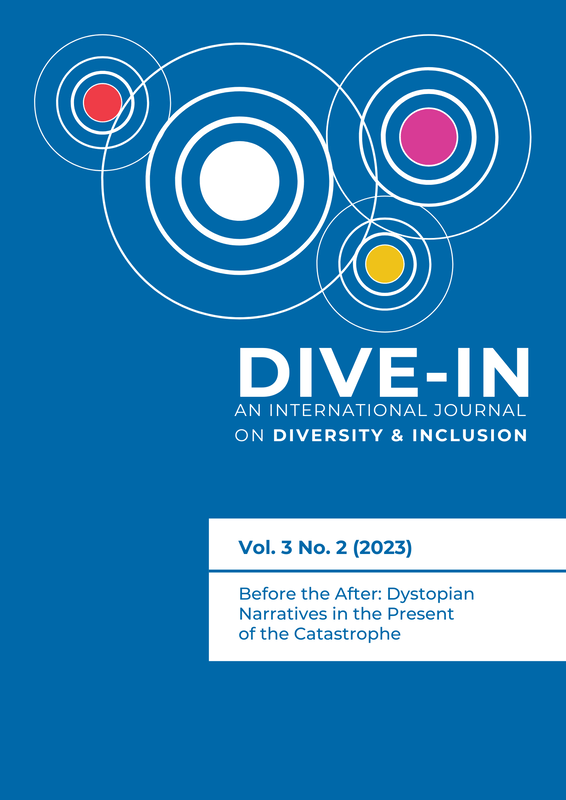Un attimo prima della catastrofe. Realismo e distopia tra “ridicole emozioni umane” e “soddisfazione del consumatore”
DOI:
https://doi.org/10.6092/issn.2785-3233/19143Keywords:
dystopia, realism, contemporary literature, capitalism, social crisisAbstract
Images of socio-political, economic, and environmental catastrophes constantly hit our imaginary: wars and humanitarian disasters provoke anxieties and mental and physical diseases. So, the boundary between realism and dystopia has become even more brittle, also in literature. The present essay intends to examine the dystopian traits of some contemporary novels – Generosity by Richard Powers, Solar by Ian McEwan, Margaret Drabble’s Pure Gold Baby, The Last White Man by Mohsin Hamid, and Richard Flanagan’s The Living Sea of Waking Dreams – which cannot be properly considered as dystopian or realistic texts. Each novel is set in times and spaces that are weirdly familiar, where alienating presents and futures develop in-between human emotions and the satisfaction of the consumer in a mercified society. The essay will investigate if contemporary novels can resist and narrate the contrasting feelings deriving from the idea that everything can happen, everywhere and to anyone, in a world where also the most astonishing and baleful warnings of the dystopian fiction are becoming real.
References
Andrejevic, Mark. 2002. “The kinder, gentler gaze of Big Brother: Reality TV in the era of digital capitalism.” New Media Society 4, 251–270.
Ballard, James Graham. 2001 (1970). La mostra delle atrocità. Milano: Feltrinelli.
Barbero, Carola. 2016. “Quanta finzione c’è nella letteratura.” CoSMo. Comparative Studies in Modernism 9, 119–136.
Baudrillard, Jean. 2003 (1981). Simulacri e simulazione. Roma: Pgreco.
Blanco, Amalio, & Darío Díaz. 2007. “Social order and mental health: A social wellbeing approach.” Psychology in Spain 11(1), 61–71.
Boehmer, Elleke. 2014. “The World and the Postcolonial.” European Review 22(2), 299–308.
Bostrom, Nick. 2005. “In Defence of Posthuman Dignity.” Bioethics 19(3), 202–214.
Brown, Wendy. 2006. “American Nightmare: Neoliberalism, Neoconservatism, and De-Democratization.” Source: Political Theory 34(6), 690–714.
Cabrero, Francisco Martín. 2016. “Sulla vocazione realista della letteratura.” Cosmo. Comparative Studies in Modernism 9, 9–18.
Caron, André H. & Letizia Caronia. 2007. Moving Cultures: Mobile Communication in Everyday Life. Montreal: McGill-Queen’s University Press.
Chakrabarty, Dipesh. 2009. “The climate of history: four theses.” Critical Inquiry 35, 197–222.
Cuozzo, Gianluca. 2016. “Un mondo alla deriva: realismo, entropia, salvezza. Tra filosofia e letteratura.” Cosmo. Comparative Studies in Modernism 9, 93–110.
De Sousa Santos, Boaventura et al. 2013. Dicionário das Crises e das Alternativas. Coimbra: Almedina.
Deotto, Fabio. 2018. “Il tempo del realismo aumentato. Un’idea di letteratura rivolta al ‘futuro prossimo’.” Il Tascabile, 16 Aprile 2018, https://www.iltascabile.com/letterature/tempo-realismo-aumentato/ [ultimo accesso 09/01/2024].
Deotto, Fabio. 2021. L’altro mondo. La vita in un pianeta che cambia. Milano: Bompiani.
Drabble, Margaret. 2018 (2013). La bambina d’oro puro. Milano: Bompiani.
Ferraris, Maurizio. 2012. Manifesto del Nuovo Realismo. Roma: Laterza.
Fisher, Mark. 2018a (2009). Realismo Capitalista. Roma: Nero.
Fisher, Mark. 2018b. The Weird and the Eerie. Lo strano e l’inquietante nel mondo contemporaneo. Roma: Minimum Fax.
Flanagan, Richard. 2022 (2020). Il vivo mare dei sogni ad occhi aperti. Milano: Bompiani.
Fromm, Erich. 1955. The Sane Society. Greenwich: Fawcett Publications,
Ganguly, Debjani. 2020. “Catastrophic Form and Planetary Realism.” New Literary History 51(2), 419–453.
Gatto, Marco. 2016. “Una poetica delle forme sociali: Jameson e il realismo.” Cosmo. Comparative Studies in Modernism 9, 81-92.
Hamid, Mohsin. 2023 (2022). L’ultimo uomo bianco. Torino: Einaudi.
Hanlon, Phil, & Sandra Carlisle. 2013. “Positive Mental Health and Wellbeing: connecting individual, social and global levels of wellbeing.” In Lee Knifton & Neil Quinn (eds.), Public Mental Health: Global Perspectives, 3–11. New York: McGraw Hill Open University Press.
James, Oliver. 2009. Il capitalista egoista. Torino: Codice Edizioni.
Jameson, Fredric. 1991. Postmodernism, Or, The Cultural Logic of Late Capitalism. Durham, NC: Duke University Press.
Jameson, Fredric. 1992. Firme del visibile. Hitchcock, Kubrick, Antonioni. Roma: Donzelli.
Jameson, Fredric. 1999. Le antinomie del realismo. Milano: Edizioni del Verri.
Jameson, Fredric. 2003. “Esperimenti col tempo: realismo e provvidenza.” In Franco Moretti (ed.), Il romanzo. Temi, luoghi, eroi. Vol. 4., 183–211. Torino: Einaudi.
Johns-Putra, Adeline. 2016. “Climate change in literature and literary studies. From cli-fi, climate change theatre and eco-poetry to ecocriticism and climate change criticism.” WIREs 7, 266–282.
Kaplan, Ann. 2015. Climate Trauma: Foreseeing the Future in Dystopian Film and Fiction. New Brunswick: Rutgers University Press.
Kardaras, Nicholas. 2022. Digital Madness. How Social Media Is Driving Our Mental Health Crisis and How to Restore Our Sanity. New York: St. Martin Publishing Group.
Kneupper, Charles, & Gary Rubin. 1975. “Personalization in Modern Society: A Diagnostic Application of General Systems Theory.” ETC: A Review of General Semantics 32(2), 169–181.
Knifton, Lee, & Neil Quinn (eds.). 2013. Public Mental Health: Global Perspectives. New York: McGraw Hill Open University Press.
Lacan, Jacques. 2016. Il Seminario. Libro VI. Il desiderio e la sua interpretazione (1958-1959). Torino: Einaudi.
Lacan, Jacques. 2019. Il Seminario. Libro XVI. Da un Altro all’altro (1968-1969). Torino: Einaudi.
Mbembe, Achille. 2017. Critique of Black Reason. Durham, NC: Duke University Press.
McEwan, Ian. 2010. Solar. Torino: Einaudi.
Mishra, Pankaj. 2018. L’età della rabbia. Milano: Mondadori.
Moussier, Marion. 2021. “A Dissonant Mind in a Dissonant Body: Allegories of Climate Change Denial in McEwanʼs Novel Solar (2010).” Études britanniques contemporaines, 60. https://journals.openedition.org/ebc/10581 [ultimo accesso 09/01/2024]
Muzzioli, Francesco. 2007. Scritture della catastrofe. Roma: Meltemi.
Nietzsche, Friedrich. 2020 (1873). Considerazioni inattuali. Sant’Arcangelo: Foschi.
Powers, Richard. 2021 (2009). Generosity. Milano: La Nave di Teseo.
Robins, Kevin, & Frank Webster. 1999. Times of the Technoculture. London: Routledge.
Shepherd, Laura. 2013. Gender, Violence and Popular Culture. Telling Stories. London: Routledge.
Stewart-Brown, Sarah. 2013. “Defining and measuring mental health and wellbeing.” In Lee Knifton & Neil Quinn (eds.), Public Mental Health: Global Perspectives, 33–42. New York: McGraw Hill Open University Press.
Stock, Adam. 2019. Modern Dystopian Fiction and Political Thought Narratives of World Politics. London: Routledge.
Zamboni, Giuseppe. 1930. La gnoseologia dell'atto come fondamento della filosofia dell'essere. Milano: Vita e Pensiero.
Downloads
Published
How to Cite
Issue
Section
License
Copyright (c) 2023 Alessia Polatti

This work is licensed under a Creative Commons Attribution 4.0 International License.





